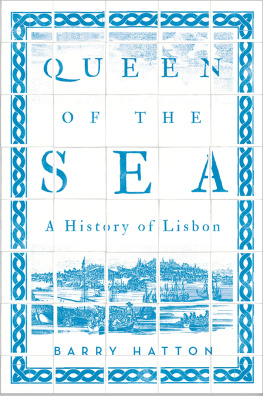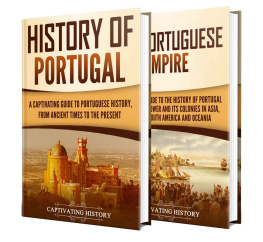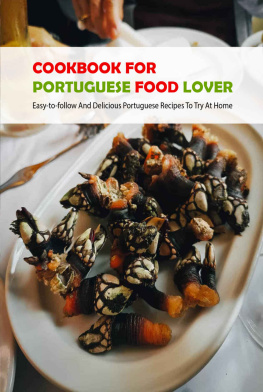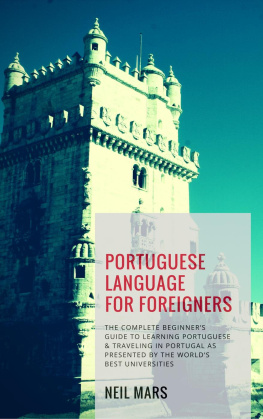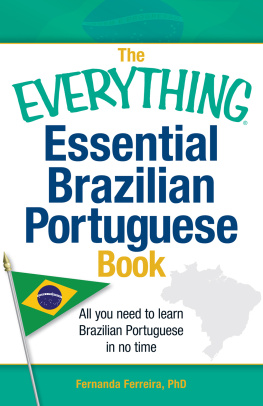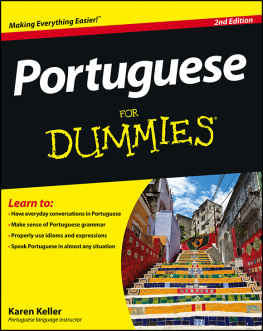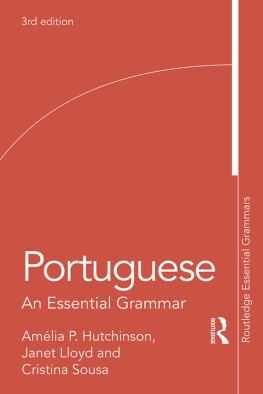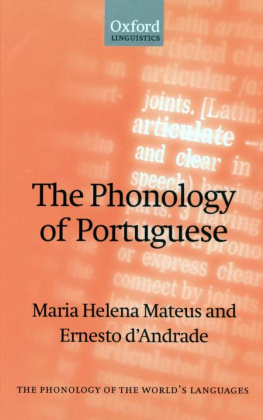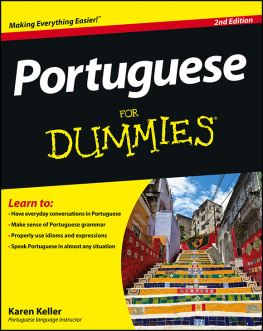Title page
The Portuguese
A Modern History
Barry Hatton

Signal Books
Oxford
Publisher Information
2016 digital version by Andrews UK Limited
www.andrewsuk.com
First published in 2011 by
Signal Books Limited
36 Minster Road
Oxford, OX4 1LY
www.signalbooks.co.uk
Barry Hatton, 2011
The right of Barry Hatton to be identified as the author of this work has been asserted by him in accordance with the Copyright, Design and Patents Act 1988.
All rights reserved. The whole of this work, including all text and illustrations, is protected by copyright. No parts of this work may be loaded, stored, manipulated, reproduced or transmitted in any form or by any means, electronic or mechanical, including photocopying and recording, or by any information, storage and retrieval system without prior written permission from the publisher, on behalf of the copyright owner.
Production: Devdan Sen Cover Design: Baseline Arts
Cover Images: vanbeets/istockphoto; TMAX/fotolia
Illustrations: Wikipedia Commons: i, x, 2, 12, 18, 24, 26, 31, 39, 46, 49, 54, 58, 69, 74, 88, 96, 101, 105, 111, 114, 124, 163, 168, 178, 200, 209, 214, 223, 228, 235, 247, 252; purl. pt: 197; Shakeoutblog. com: 184
Please note page numbers apply to print edition of this title
Preface
As a Lisbon-based foreign correspondent for more than two decades I have written thousands of articles about Portugal but I am forced to acknowledge - it feels like a rebuke - that this country remains little-known abroad, even in the rest of Europe, even in Spain. That was one of the reasons for writing this book: to plug a gap, I hope, and to wake foreigners up to Portugals enduring appeal. Wider recognition is owed to its fascinating history, which includes the first steps towards globalization and a spell as the worlds richest nation; its climate, which is as agreeable as the gentle and hospitable Portuguese people; a captivating variety of countryside within a relatively small space; and food that is so good that overeating is always a temptation.
Another motive for this book was that I had built up a critical mass of intimate knowledge about the Portuguese way of life which needed to find expression. Selfishly perhaps, I had to put it somewhere, tidy it away. Almost daily reporting on Portugal has filled countless notebooks , and much of what I have recorded over the years had to be left out of newspaper and magazine articles for reasons of space. Some of the evidence set out here is anecdotal, the fruit of years of travel around Portugal and to its former colonies, and drawn from enlightening conversations with Portuguese friends and family. In that way, I hope to provide a view from the inside and the outside.
A third cue for this account was to offer solutions to an abiding puzzle. I have often been asked by my editors abroad how Portugal came to fall so far from the glorious days of the fifteenth and sixteenth centuries. Even Portuguese friends prod me for theories: What happened to us? they ask, eager for a concise explanation of why Portugal is nowadays Western Europes poorest country - in cash terms, anyway. It is a big question, though, and it could never begin to be addressed in a single newspaper article, nor in a passing conversation. Possible answers can be teased out only in a whole book.
The riddle of Portugals economic misfortune is all the harder to figure out because while the Portuguese are marvellously cordial and affable people it is notoriously difficult for outsiders to get closer to them, to step into their intimate and tightly-wrapped social circles where many of the answers lie. Some twelve million tourists come to Portugal each year, but many of them head straight to the many delightful beaches. Most could probably name a Portuguese footballer, or identify port wine as a Portuguese product. But beyond that foreigners know little of the real Portugal, and find it very hard to fathom. In this effort they are handicapped, first of all, by unfamiliarity. How often do you read about Portugal in your daily paper? How much does the general public abroad know about, say, the Age of Discovery and Portugals four-continent empire, Antnio Salazars prolonged twentieth-century dictatorship, or the Carnation Revolution that brought democracy in the 1970s and laid the foundations for Portugal to blossom as part of modern Europe?
This country can be all the more baffling if it is approached on the premise that it must be like Spain, which it is not. The seemingly impenetrable language, the sound of which was once likened to windsurfing from consonant to consonant, is another barrier. My intention, then, is to shine a light on this enigmatic corner of Europe, describe the idiosyncrasies that make this lovable and sometimes exasperating country unique, and seek explanations by surveying the historical path that brought the Portuguese to where they are today.
Dangers lurk, of course, in any attempt to synthesize an entire country in a few hundred pages. Broad brush strokes cannot capture the whole story, and some may be stung by generalizations they feel do not apply to them. Nevertheless, I have sought to convey the differences in Portugal between the urban elite and the largely overlooked countryside, and the generation gap between young people who have grown up as members of the European Union and their parents.
All that is between these covers was compiled in good faith by an author who owes some of the best years of his life to Portugal. My Portuguese colleagues have expressed astonishment at my refusal of job offers in New York, London, Brussels and Madrid. They think I am mad. But I wanted to stay because Portugal, in some vital respects, beats those places hands-down. Many will agree. Others will discover Portugal and come to the same conclusion.
I must acknowledge the contribution to this work of my wife Carmo, who at times had to set me straight and whose cheerful optimism kept me going; my parents Roy and Rita Hatton for their encouragement and curiosity; my mother-in-law Lusa Beltro, who invited me to co-author the first biography of Portugals only ever woman prime minister, which came out in 2007; my valued friends Sandy Sloop, and Axel and Aida Bugge, for their unstinting support, wisdom and enthusiasm; and my children Joo, Maria and Madalena, who just generally make the world a better place.
Dedication
This book is for my family, British and Portuguese
Introduction - Wrestling with Bulls
At the third bugle call bullfights in Portugal climb to their climax.
In the shirt-sleeve nights of the summer bullfighting season the circular arena blazes with bright light like a boxing ring. A lone bugler standing on a platform in the steeply-terraced stands announces the start of the event, and the crowds excited chatter thins to an expectant murmur. A second burst from the bugle brings out a bullfighter on horseback. Heavy wooden gates are drawn apart and a bull bursts into the enclosure. A lively beast elicits a hum of approval from the crowd. With theatrical skill, the flamboyant horseman keeps his horse just beyond the reach of the horns as, in repeated charges, he sticks half- a-dozen barbed darts between the bulls shoulders. He salutes the cheering crowd and sidles triumphantly from the ring, leaving the panting bull alone.
Then the bugle sounds for a third time. On cue, eight young men vault over the arenas painted boards, their legs together, tidily, like gymnasts , and stride towards the bull. They are forcados , a group sometimes described by wide-eyed foreigners as the Suicide Squad. They are impeccably attired in spotless white, knee-length stockings, skin-tight trousers, clipped waistcoat and jacket (traditionally blessed at a special Mass), a crimson length of cloth wrapped around their midriffs, a prim white shirt and tie. These amateur entertainers have been watching the bulls movements intently from the ringside while the horseman performed his tricks. They solemnly approach the fearsome beast in single file so it can only see the man at the front, lest it be scared it off by weight of numbers. The one at the front, who wears a floppy woollen cap pulled down to his eyebrows, proceeds with dramatically paused paces towards the bull on the far side of the ring. He puffs out his chest, places his hands on his hips and bellows Toiro! Toiro! (Bull, bull!) to taunt the half-ton of muscle and bone into charging at him. The crowd tenses up and mutters in anticipation. Some spectators cover their eyes. The bull snorts and, before long, it arches its back and dips its head, horns parallel to the ground, and kicking up bursts of sand with its stubby legs pounds towards the man who coolly steps into the gap between the horns, falls forward and grabs the bull around its tree-trunk of a neck. He hangs on for dear life as it flips him around like a rag doll. The crowd gasps. Sheer momentum means that the bull and his passenger plough full-tilt into the others behind who ricochet off the beast like skittles. Quickly they regroup and smother the bulls head and eventually it slows to a standstill. They do not always pull it off at the first attempt. Sometimes they have to dust themselves off, wipe away blood, and line up again. Occasionally, bones are broken and flesh is torn. It is a display of nerve that merits a standing ovation.
Next page

